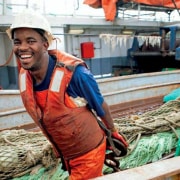|
Getting your Trinity Audio player ready...
|
By Richard Messick
First posted on the Global Anticorruption Blog
Thanks to a last-minute legal manoeuvrer, defendants in Namibia’s largest ever corruption case again escaped answering for their crimes. Set to start 5 August, their trial was postponed pending a ruling on a long-shot motion to invalidate all pre-trial rulings. While unlikely to succeed, the motion opens the chance for even more delay as its denial will almost surely be appealed.
It is now approaching six years since former Justice Minister Sacky Shanghala, former Fisheries and Marine Resources Minister Bernard Esau and accomplices were arrested for their roles in a bribery scheme giving Icelandic fishing company Samherji the exclusive right to catch horse mackerel in Namibian territorial waters.
Dubbed the “Fishrot scandal,” the case initially promised much. To Namibians who lost their livelihood thanks to the scheme, the chance for compensation. To the international community, a demonstration that a young nation still consolidating democratic norms could hold the powerful to account.
What the case has become instead is another demonstration of a principle all too common in corruption cases: justice delayed is justice denied.
At every opportunity, Fishrot defendants have turned rules meant to ensure criminal trials are fairly conducted into weapons for postponing theirs. A trial where given the evidence on the public record, it would be shocking if the result were anything but a guilty verdict followed by an order confiscating their assets.
The most recent example is the last-minute motion by former Minister Shanghala challenging the validity of the pretrial rulings that forced the 5 August postponement. That motion arises from the claim that the then presiding judge, Justice Moses Chinhengo, was appointed unlawfully, and hence his many pretrial rulings were without legal effect.
Justice Chinhengo was appointed in September 2023. The facts of his appointment were known then. In proceedings later that year Shangala raised the appointment question in open court. Why wait until 17 July 2025, less than three weeks before the long-scheduled trial, to bring the motion?
A second example illustrates gaming defendants’ right to counsel to frustrate justice.
It is a bedrock principle of Namibian law, grounded in the Constitutional provisions guaranteeing a fair trial, that defendants are entitled to a lawyer, and that if they are indigent, the government will provide them one. At the outset of the case all defendants had retained lawyers — experienced, high-priced ones at that.
Shortly after his September 2023 appointment, made with the express mission of moving the case expeditiously, Justice Chinhengo set a hearing to clear the decks for trial. One matter was the formal entry of a plea. While all defendants had loudly and frequently voiced their innocence in public, they had not stood up in court and said, “not guilty,” a necessary if ministerial prerequisite to a trial.
But what should have been a straightforward, non-controversial proceeding turned into a fine example of delay and obfuscation. After attempts to get the defendants’ lawyers to find a time where all could be present when their clients formally pled “not guilty,” a hearing was finally set for December 5. When defendants appeared, former Justice Minister Shanghala and two others said they could not enter a plea because their lawyer had withdrawn from the case the night before.
The events Justice Chinhengo recounts in a March 2024 opinion wreak of a delaying tactic. Lawyers withdrawing the night before a hearing? When the hearing date was known for several weeks? And does a former Justice Minister really need a lawyer’s advice before standing up and saying, “not guilty”?
While the withdrawal was prompted by defendants’ inability to continue paying counsel, several had for some time been in discussions about having the government pick up the tab. But the set rate the government pays lawyers representing indigent defendants was apparently too low to interest the lawyer for several defendants. So he simply dropped them as clients.
From what the Chinhengo opinion says, defendants appear to have no interest in a lawyer willing to accept the government’s rate. Defendants could have asked him to intervene and see the government appointed counsel and even address the fee issue. But they have not.
Meanwhile, studies by Namibia’s Institute for Public Policy Research document the long-term damage, not only economic but psychological, that Fishrot has wreaked on communities where the domestic fishing industry once prospered.
There is little doubt that Justice Chinhengo saw through defendants delaying tactics. Now that a new judge has taken over the case, those suffering from Fishrot’s wrongs and all those in Namibia and elsewhere rooting for a young democracy to show the will and capacity to fight corruption can only hope that she will not tolerate further delay and her colleagues on the appellate bench will back her.
Time for defendants to have their day in court.






